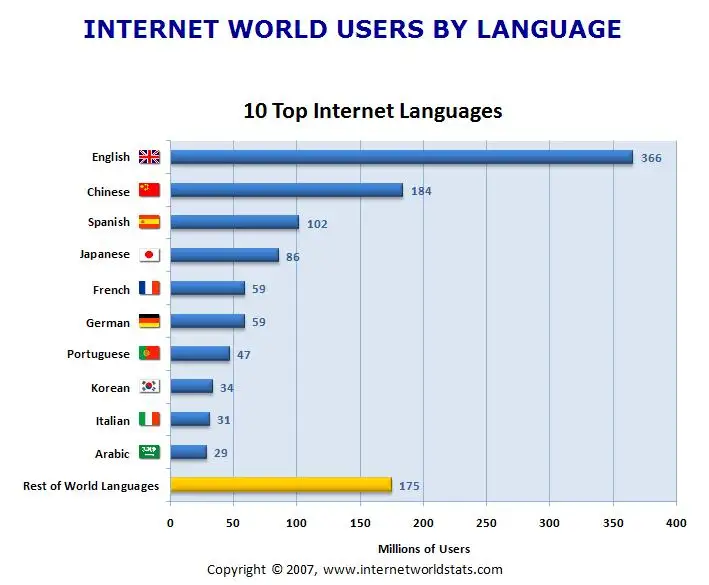Not English, but a multilingual social web is the key for collaboration
The social web is quite separated in different language domains. English is a key language to bridge different cultures, but it can also be a dead end. Worldwide collaboration can only work in a multilingual network.
English is one of the major languages on the net, whether it is on blogs, social networks or the chitchat on twitter. But languages are still breeding fast though the social web; the Japanese blogosphere is one of the biggest ones, for example, Google's social network, Orkut, is the biggest in Brazil and India. Tanzania is also one example for a vibrant Swahili blogosphere. Chinese mandarin will be the most spoken language on the web. Global Voices is one of the few websites trying to connect cultures. Volunteer translators give insights to countries and cultures where usual media outlets do not report from.
But let's have a look at the issue of language. Dave Gray has a nice visualization for different dimension of language here. He drew the four steps of language:
- Communication
- Conversation
- Collaboration
- Co-creation
On this United Nation website for cultural diversity it says, "Language not only communicates, it defines culture, nature, history, humanity and ancestry." There are between 6.000 and 7.000 spoken languages on this world and unfortunately half of them are in threat of extinction. Language is fundamental for the collaborative web. It can enrich a discourse through blogs.
Translating machines have improved significantly. One example is the google translation for Arabic. **But when it comes to collaboration, it is up to users to find a way to interact. **How can we achieve this multilingual web? It needs a high language skill to collaborate effectively and creatively. A long tail of language has emerged. The future focus should be on networks with cross language interaction. Each language has a unique set of concepts, beliefs and expressions, which risk to be lost if all relies only on English.
So it is a dilemma. **On one way English allows us to communicate worldwide, but at the same time it narrows down the potential for collaboration by simply contradicting cultural diversity. **It greatly connects worldwide people, however, it is limited to small proportions of web users capable to read and write in English. I am personally in the same dilemma. I would love to blog in German -- as being it my native language, my writing is much better -- but I decided to blog in English to be able to network in this vast social network. Mixing languages can be possible as we have done it through the web2fordev conference blog, but even for that blog it was quite difficult to get French speaking authors involved.
Here it is an interesting statistic for the main languages in the Internet. There is a tendency towards a few strong languages. There are four languages not based on Latin characters. By the way, it took more than ten years after the Internet's major breakthrough for ICANN to announced on the Internet Governance Forum to offer internationalized country code for top-level domains -- and this just happened recently. This would mean that Chinese or Arabic letters become possible in domains. Ethan Zuckerman wrote more on that, and here, the UNESCO.
At last, languages are also important to protect our environment and can be decisive to preserve our biodiversity.
The links between language, culture and the environment suggest that biological, cultural and linguistic diversity should be studied together, as distinct but closely and necessarily related manifestations of the diversity of life on Earth. Researchers have referred to this new field of study as “biocultural diversity”.
